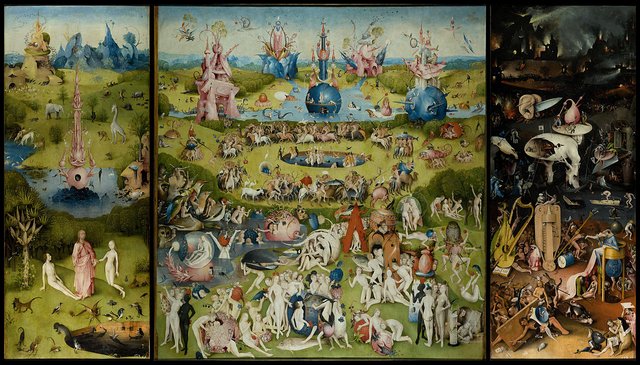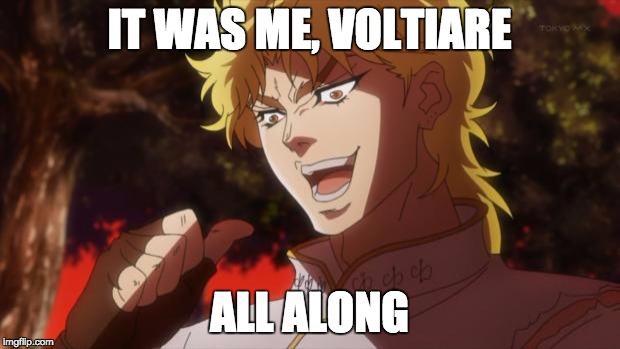Would you rather suffer or do nothing? That is the final question in Voltaire's Candide or the Optimism.

The story of Candide is a travel diary of his adventures, but above all, it is a satire, just like; South Park, the Daily show and the most infamous: Pepe the frog.
Satire is an art genre that makes fun of social issues, so to create a social movement to abolish or adjust the things that are made fun of, with the end goal of resolving the problem.
Candide is under the tutorship of Pangloss a philosopher of the Optimism of Leibniz. This is a philosophy that everything is for the better, and that all suffering is a mere consequence of all that is good. Voltaire pokes fun at this idea by letting his characters endure the most gruesome things, that have not even a trace of the good in it and then let his characters argue for the Optimism. By letting his characters use the Optimism in such extrapolations, you will see how faulty the reasoning is.
When Candide and Cunégonde, the daughter of the baron in whose castle Candide resided, performed (sexual)experiments on him, Candide got a boot up his ass and kicked out of the castle, thus starting his travels.
By calling it sexual experiments, Voltaire makes fun of Plato’s allegory of the cave, by using it at something that is clearly not related to any of the thing Plato meant.
Candide fled to holland where he found the most altruistic person in the book: The Anabaptist. Voltaire satirizes religion a lot in this book and this is one instance. It is as if he screams to the reader “You don’t have to be a catholic to act good.”
He also finds Pangloss, who tells him the most horrible thing that could happen happens: The castle got raided by the Hungarians, but as Pangloss will always say in this book: This is the best of all possible worlds and if that did not happen, he would not have found Candide. You will see this explanation getting more and more ridiculous through the book.
Candide now travels to Lisbon, where Pangloss get killed, and he finds Cunégonde, Buenos Aires, where Cunégonde marries the governor for financial safety. Voltaire made fun of the classic love story here, because he made Cunégonde chose to to her financial safety over Candide even thought Candide would do anything to get her back.
He travels to the Land of the Jesuits, where he finds and kills the brother of Cunégonde, because he did not want him and Cunégonde to marry, to Eldorado, where he gets a bunch of riches, to Suriname, where he loses most of his riches to a scammer, where he sends his servant to get Cunégonde back who stayed in Buenos Aires and where he gets a philosopher Martijn to travel with him.
In Paris, Candide chills with the social elite and due to his wealth, he gets a bunch of people, who rip him off. Here Voltaire makes fun of the royals, because even though they have a lot of money they still steal his riches.
In Venice, he is sad that Cacambo and Cunégonde are nowhere to be found.
He does find a rich Venetian count who is so indulged in cultural treasures that he does not find any of them appealing, here Voltarie makes fun at people that are so used to this that they can only find faults in it and it’s no coincidence that he is a royal again.
and six dethroned kings, one of which has Cacambo as a slave. Saterizing royals? again! He is criticizing the claim of kings that they are chosen by God and saying, “if you’re chosen by God then why can you be dethroned?”
Candide buys him free and asks him to bring them to Cunégonde and her slave. On the boat, they discover that Pangloss is rowing as a slave and Candide buys him free. Even after what he has been through he argues that all is suffering was merely a means to be back with his friends.
They got Cunégonde and bought a small farm.
When they get utterly unhappy they ask "Is it better to do nothing or suffer as much as we did?" They ask the best philosopher of the region and he says that they should not bother to ask.
At last they discover a farmer who does not discuss and does not philosophize but is very happy. Inspired, Candide and his friends do the same. Where he famously says, “Let us cultivate our garden.” This is a reference to the Bible, where Adam and Eve were put in the garden of Eden to cultivate it and not to discuss. Because, it was when they ate the apple of knowledge and were able to discuss, that they got banished from the paradise.

Quite the story, especially in just about 102 pages, this is an information dense novelle. I hope that after this little summary you will want to know more about this book and especially why it is written.
Candide or the Optimism was written in the age of enlightenment, and this age is not called the age of Voltaire for no reason.
Voltaires life in relation to Candide or the Optimism
The legend goes that Voltaire locked himself up in his room and after four days he got out and gave a manuscript to his niece, who also was his mistress, and said, "Here ma'am a little something for you to read!"
Voltaire had a habit of making friends with kings and aristocracy, after which he made a satire about them, or shamed them in another way, and got himself thrown in prison, banished or chased.
This is just like Candide, who in the story is in favor of people at one moment, and the next moment he is out of favor and has to flee, gets thrown out, or they try to kill him.
While he was banished to England, Voltaire became friends with Jonathan Swift, an English parents, Irish satire writer. Swift's Gulliver's Travells was probably an inspiration for Candide.

Voltaires own philosophy and the Optimism
In the end of the novelle, Voltaire let himself speak as a Turkish philosopher. His main point with that is that philosophy like Socrates, or Leibniz, should not be practiced, because it doesn't matter who is wrong or right, the world will stay the same.
Voltaire believed that the earth was created by a God, but that his God had left the earth for what it was and moved on. This was the only way he could see a Christian God, who still was omnipotent, omniscient and benevolent, but a world made for suffering.
This is also the main reason why Candide was written: as a critique on Optimism and on Philosophy in general.
Candide or the Optimism: themes
Money In the book it does not matter if you are rich or poor, you will always have problems with money. Money in Candide never gives happiness, the Count who has everything is so used to the perfectness that surrounds him, that now he can only see flaws. When Candide gives money to poor people they spend it fast and only grow more unhappy. At the end of the book, the happiest man is a farmer, who does not care about money or reason, but just farms.

Hapiness In the book Candide and Martijn discuss if there is a happy person on this planet and if they can find him or her. Candide keeps on losing the discussion and whenever Candide sees someone who is happy, they turn out to only look happy and not be happy. Even in the utopia of El Dorado, Candide can't be happy because he misses Cunégonde. This is a satire of that people always want something even if they are in paradise and that therefore a true paradise can not exist.
Candide and the bonus facts
The names of the main Characters all have a special meaning:
Candide means innocence
Pangloss means windbag
Cunégonde was sexual slang in eighteenhunderd.
Voltaire wrote Candide under a pseudonym, but after the religious figures of Swiss burned his books he told them that it was him, Voltaire, all along.

@galseaknunduie - loved to read your post! I haven't read the book but is now on my "must reads"! Upvote and followed! Please do more of these!
Downvoting a post can decrease pending rewards and make it less visible. Common reasons:
Submit
Thanks, man, I would love to do more too!
Downvoting a post can decrease pending rewards and make it less visible. Common reasons:
Submit
Comment removed
Downvoting a post can decrease pending rewards and make it less visible. Common reasons:
Submit
Congratulations @galseaknunduie! You received a personal award!
You can view your badges on your Steem Board and compare to others on the Steem Ranking
Vote for @Steemitboard as a witness to get one more award and increased upvotes!
Downvoting a post can decrease pending rewards and make it less visible. Common reasons:
Submit